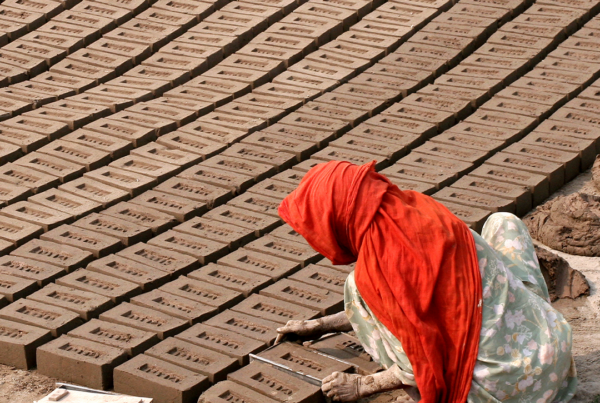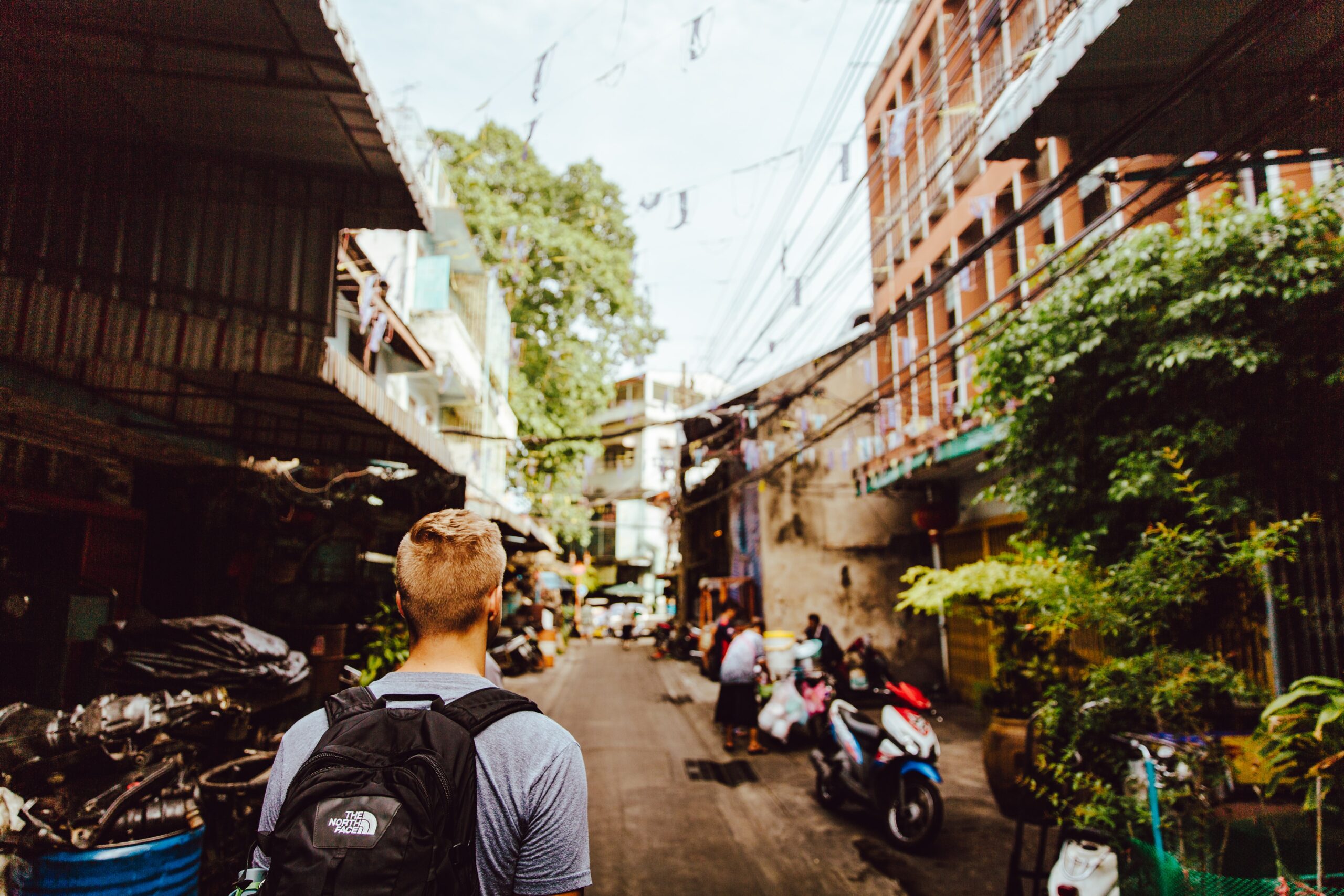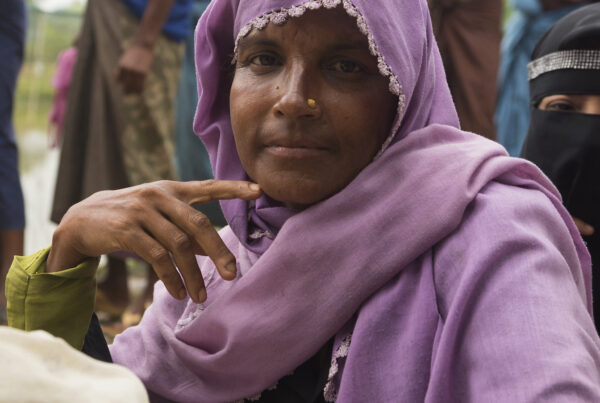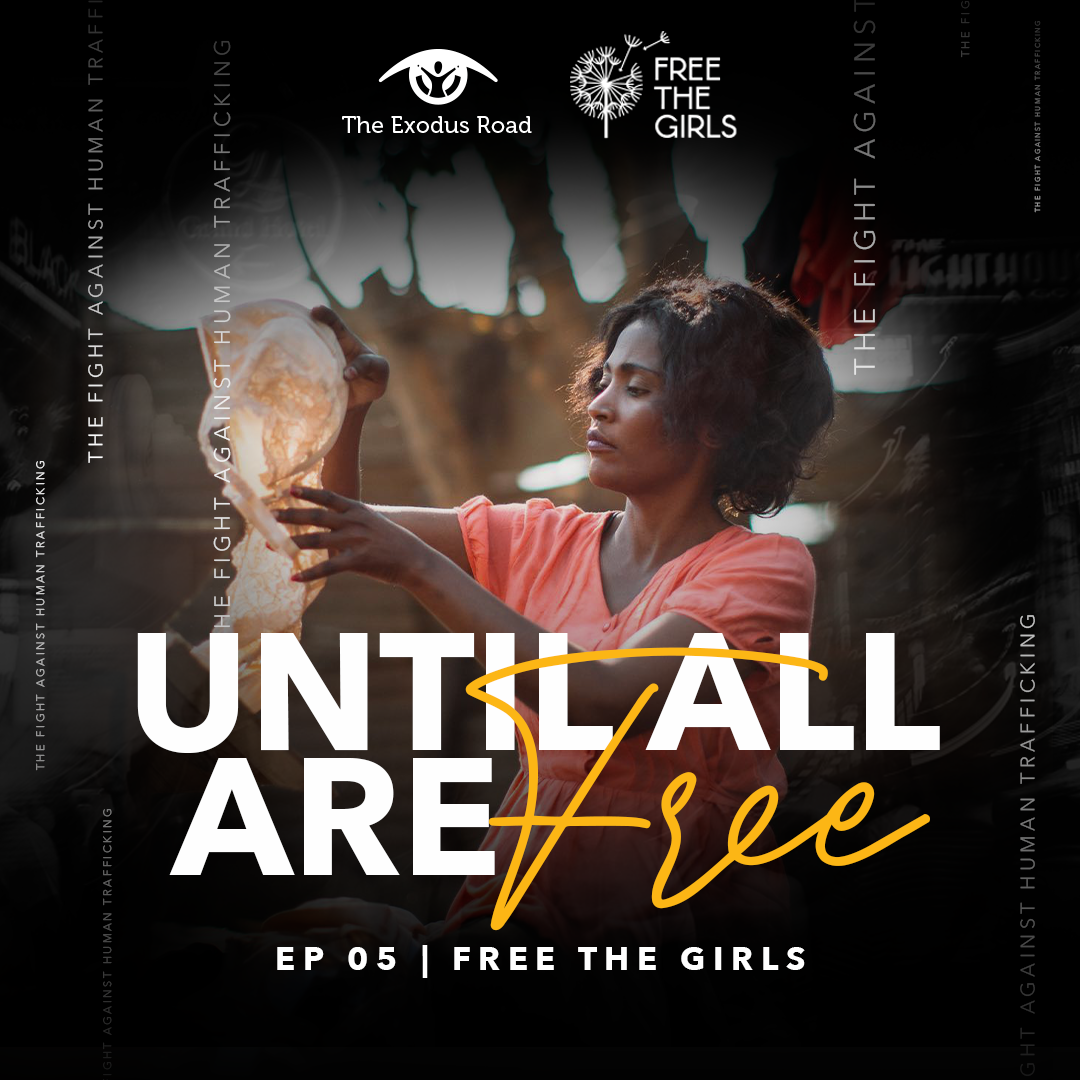
Episode Transcript
Note: Until All Are Free is produced for the ear and designed to be heard. If you are able, we strongly encourage you to listen to the audio. Transcripts are generated using a third party speech recognition software and may contain errors. Please check the corresponding audio before quoting in print.
Preston Goff: (00:25)
This is Until All Are Free. I’m Preston Goff. On today’s episode, we’re sharing an interview led by our president, Laura Parker, with Courtney Skiera-Vaughn, the Executive Director at Free the Girls. In the fight against human trafficking, there are organizations helping survivors in each component of prevention, intervention, and aftercare. At the Exodus Road, our primary focus is on the intervention, the rescue of survivors of human trafficking. Free the Girls is an aftercare organization, which exists to help women rescued from sex trafficking reintegrate into their communities. They see a world in which previously enslaved women are leading vibrant, successful and integrated lives. Though the Exodus Road focuses on intervention, the physical rescue of survivors from dangerous situations around the world. We acknowledge that a survivor’s journey only begins at rescue. Organizations like Free the Girls see these survivors through to a more holistic finish line. So in that spirit, here’s the interview.
Laura Parker: (01:31)
Courtney, we are so excited to have you on the Until All Are Free Podcast. Thank you so much for joining us today.
Courtney Skiera-Vaughn: (01:41)
Oh, thank you for having me. I’ve been a big fan of Exodus Road for a long time and I am really excited to chat with you.
Laura Parker: (01:47)
Oh, that’s awesome. Well, listen, why don’t we start off by you just giving us a little overview of who you are as a person, where you live, your family, your career path, and then also what led you to care about the issue of human trafficking in the first place?
Courtney Skiera-Vaughn: (02:04)
Sure. So I am currently living in Northeast Tennessee, beautiful area with all the mountains. I have a husband who is very involved in justice work as well. I have two little ones, a three year old daughter and a son who is going to be two in about two weeks. So I’m pretty busy. I just finished my PhD in psychology with an emphasis on how culture affects the manifestation of stress and trauma. So psychology is my educational background. My parents were in nonprofit work as well, so I was destined to kind of go that way. I was in college when I first heard about the issue of human trafficking, and I just remember being shocked of, excuse me, what? What is happening? Now? Is this real?
Courtney Skiera-Vaughn: (03:02)
And just not being okay with it and deciding, well okay, if this is a thing that’s happening, what is my part to play in this? How can I leverage my education, and my experience, and my time and my passion to help fight for justice, because this isn’t okay. I hadn’t planned on actually getting into a career in anti-trafficking, but one thing led to another and it’s something that gives my life a lot of purpose. And there’s a lot of joy in working with these women, and educating other people and reminding them that everybody has a part to play in the global fight against human trafficking.
Laura Parker: (03:51)
So you work with an organization called Free the Girls, which by the way, is I think perhaps the best brand of any nonprofit fighting trafficking that I have heard. I love it. Can you tell us a little bit about what Free the Girls is? How long you guys have been around? Where you work in the world? And what your focus is?
Courtney Skiera-Vaughn: (04:14)
Sure. The name is great. I wish I had come up with it, but I did not. We provide reintegration services for women coming out of sex trafficking. We work in Central America and Sub-Sahara Africa, specifically Mozambique, El Salvador and Costa Rica. We had worked in Uganda at one point as well, but ended up phasing that program out. We partner with existing organizations that are working on the rescue and the rehabilitation of these survivors, and we provide the reintegration piece. So we know what these women are being rescued from. Free the Girls is trying to answer the question, what are these women being rescued to and how do they reintegrate back into their communities? How do you come away from this oppression and this experience and still be a functioning, healthy member of society?
Courtney Skiera-Vaughn: (05:15)
One of the biggest challenges for survivors of trafficking is economic empowerment, is jobs, finding jobs. And so that’s what we do. That’s what we are best known for. This is where the brilliance of the name Free the Girls comes in. We provide the women in our program with bras, new and gently used bras that are donated from women, and companies and men too sometimes from all over the world. And these bras become the inventory for these women to sell in their local markets. They make enough for a livable wage, as well as to be able to save for when they graduate out of the program. And the reason bras work really, really well, it’s a couple of different reasons.
Courtney Skiera-Vaughn: (06:01)
One, the areas where we work bras are considered a luxury item. They show how cosmopolitan you are and how modern you are. And because of that, they’re able to sell for top dollar. A woman in El Salvador only needs to sell three a day to make a livable wage. Not a minimum wage, a livable wage. And the other great thing is that the transaction of money can be a trigger for women coming out of prostitution and commercial sex. And so with bras, they’re selling exclusively to other women. Women are the ones buying the bras. And so they’re able to kind of take a step back from any male clientele, which could bring up all sorts of memories, and trauma and all of this as they are working through that trauma, and learning what constitutes a safe man and learning their new place in the local economy.
Laura Parker: (06:50)
I just love the intentionality around every single piece of that. I love that you all have thought through, what does it mean to take women and give them something that they can be proud of to sell? I love that you put them in a marketplace selling to other women. It’s just beautiful. Here’s a question, how difficult is it to actually work? I mean, I know when we think about rescue, and we think about aftercare and we think about reintegration, I think a lot of people think that after a rescue, or after an operation, or after a survivor is removed from an intense environment of human trafficking, that that’s the end of the story. And we say around here, rescue is really just the first step towards a really long journey of freedom, and that involves aftercare, it involves reintegration. Can you tell us a little bit about the differences between aftercare and reintegration? If I’m understanding it correctly, Free the Girls is really focused more on that reintegration side of the house. And then can you also talk to us a little bit about why it’s such difficult work?
Courtney Skiera-Vaughn: (08:04)
Absolutely. So the difference between aftercare and reintegration, so in victim services you have the three Rs, rescue, rehabilitation and reintegration. A good analogy is, imagine you were in a car accident, a really, really bad car accident. And the ambulance comes, and jaws of life, and they get you out and that’s that rescue part. And then they take you by ambulance to the hospital, and you have triage, and they’re assessing you, the immediate needs. And maybe you go into surgery and you’re in the hospital for a while, and they’re assessing, what do you need? What are your needs? What kind of injuries have you had? You could even have physical therapy, or rehab, or rehabilitation. And that’s all incredibly necessary and important. And then at some point they discharge you from the hospital, you’re done.
Courtney Skiera-Vaughn: (08:59)
And now you go back to your quote unquote normal life, and now you have to learn or relearn how to go up and down the steps to your apartment by yourself. You need to learn how to get out of your bed in the middle of the night to go to the bathroom without assistance. You’re back on your own. This is a very challenging thing for anyone who’s gone through chronic trauma and trafficking situations. You have a lot of aftercare facilities in which women and their beneficiaries, they thrive. They do so well. They do great with trauma counseling, and sobriety and learning all of these different things, but it’s still in a very isolated, safe environment. And then it’s, great, you did well. We’ll give you a couple of months rent, we’ll give you some referrals, we’ll check up on you, but essentially you’re on your own again. You need to learn to be independent.
Courtney Skiera-Vaughn: (10:03)
And then these women, and men as well, but then they have to learn how to find a job. And if they have a rap sheet, that’s very difficult. And in the areas where we work, Freedom Business Alliance estimates that 80% of those that are rescued from trafficking will be re exploited simply due to a lack of job opportunities. That’s huge. And especially in the developing world, in these collectivist, communal societies, there’s a huge stigma and shame around what these women have gone through. Even if it wasn’t their fault, it’s, I’m not going to hire you. You can’t come into this church. We know who you are, you can’t work here. And so it’s very difficult for these women to find employment, which is why with Free the Girls, they are entrepreneurs. They create micro enterprises selling these bras. They don’t work for Free the Girls, they don’t work for our partners, they work for themselves.
Courtney Skiera-Vaughn: (11:06)
And it’s also a way in which these women have had all control taken from them, they now get all of the control. They get to decide where they work. And when they work and who they work with, and they are completely capable of making their own choices. And so that’s why it’s so important is the, what’s next? You’re absolutely right, rescue is the very first step in a very long journey towards true freedom.
Laura Parker: (11:36)
That’s so good. Do you find that most of the women that you all work with at Free the Girls, do they go back after they get out of aftercare services, immediate services, do they go back to their original communities or do they tend start over in new communities?
Courtney Skiera-Vaughn: (11:55)
It’s different in each of our locations, which is another great thing with Free the Girls, is that we’re able to kind of tailor our program based to the unique and specific needs of that population. So in Mozambique, the women are able to make enough money to where they can purchase land and kind of become community leaders, and are then accepted back within their original community. Places like in El Salvador, they were mostly trafficked by the gangs. And so there’s a security and safety risk that’s there, and so they kind of create a brand new community and reintegrate into a new neighborhood, and into a new place and are able to kind of start fresh. So it’s really specific to the way the trafficking occurred and just the culture in which the women live.
Laura Parker: (12:48)
Can you walk us through some of the biggest challenges? If you had to boil it down and tell someone who is super excited about getting involved in the work of reintegration for survivors, and they had an idea and they wanted to jump in, what would you tell them at the beginning of their journey? If you could say, hey, just so you know, these are going to be two of the biggest things you’re going to face in this work?
Courtney Skiera-Vaughn: (13:20)
I’d say the biggest challenge is the learned helplessness that a lot of survivors carry with them. The lack of confidence. Many of them have been instructed where to go. You need to make this much money, you’re going to sleep with this person. There hasn’t been choice and there hasn’t been control or agency in that person’s life. And so, really being able to encourage that person that, no, you can do this. You don’t need to be dependent or reliant on another person. It’s reminding them that they have the capacity to be their own person. I think that’s the biggest challenge. That, and allowing them to dream. When a woman enters into our program, we always ask her, what’s your dream? If you had enough money to pay rent and feed your children, what’s your dream? And the vast majority of them respond with, what are you talking about? I don’t understand the question.
Courtney Skiera-Vaughn: (14:34)
And when you’ve been living in situations in which you’re not even able to dream anymore, that’s huge. You’ve been in survival mode, not, oh, I can thrive now. And so that is a huge challenge, is just walking alongside these individuals and reminding them that they can be independent, that it did happen to them, it doesn’t define them, that we’re helping you move, not just from victim to survivor, but from survivor to a functioning member of society that this happened to.
Courtney Skiera-Vaughn: (15:10)
I would say another huge challenge is partnership, and collaboration and finding individuals that you can really work well with. We at Free the Girls believe that everybody has a part to play, and that’s why we don’t do the rescue, and the rehabilitation and the reintegration. That’s a lot. We focus on the reintegration part, and we partner with individuals who do that rescue and that rehabilitation. And they do that so well. And we try to do our part so well and just say, okay, you have this amazing program. Let us help you reintegrate these women. Let’s help you with this exit strategy. I think as human trafficking and the issue around human trafficking really became a part of the social dialogue 10, 15 years ago, you had a lot of organizations pop up around that. And so you had a lot of organizations that were doing very similar things in the same areas, and I think you lose sight of the whole issue and the whole, when the tide comes in, all the boats in the harbor rise. We’ve lost the ability to celebrate the successes of other individuals, and to collaborate and partner.
Courtney Skiera-Vaughn: (16:42)
And again, not just network, which can kind of be smarmy sometimes. It’s more of a, ooh, what can I get from you? And who are your people? But really partner and say, I have this, you have this. If we put this together, this would be incredible for these survivors. And I have started to see probably in the last two or three years, more of a shift towards that collaboration, towards that celebrating each other, and it’s a very, very beautiful thing. And it’s starting to not work under that scarcity mentality, but the there’s enough to go around. And also, I think that a lot of individuals, they’re overtaxed, they work long hours. This is not an easy field to be in. You know this. It is mentally, and emotionally, and physically and all of the ways exhausting. And sometimes you just don’t have the capacity to talk to another leader when you’re so busy trying to help the individuals in your care, in your organization. And so, I think that some people who do want a partner just don’t have the space to be able to do that right now because of limited resources.
Laura Parker: (18:07)
Yeah. I totally identify with everything that you just said about that, and I do think there is a positive shift coming. But I also really identify with what you just said in the last piece of that answer, that oftentimes in nonprofit work, and especially in this field, it is so dark, and so heavy and it takes a hundred and a thousand percent just to keep your head above water, and to keep the work above water and to keep the organization above water, that it really strips the gears to give you the capacity sometimes to look around and to have phone calls or have intentional investment of time into other partnerships.
Laura Parker: (18:50)
And I think that is really indicative across the board. And in probably a lot of spaces for nonprofits that are that smaller, midsize nonprofits, which I think both of our organizations are, it just takes a lot to keep the ship above water and moving forward. And sometimes that can really limit capacity, but it’s sad because it also feeds into this environment of everyone being super tunnel visioned into what their thing is and pushing their thing forward. And it can really tend to have a negative impact on the survivors and the issue at large, because obviously if we work together, there’s a lot more that can be accomplished as a whole. But yeah, I totally hear you.
Courtney Skiera-Vaughn: (19:37)
I would also say that it’s healing when you do connect with other individuals, other people in this space, because you’re right, it does take so much out of you day in and day out. And so I think we need to take those steps to reach out to other individuals for our own mental health as well.
Laura Parker: (19:57)
Yes, absolutely. I, yes, totally agree with all of that.
Laura Parker: (20:11)
Can you walk us through, Courtney, the journey of a survivor that has successfully reintegrated into a healthy life after a human trafficking situation that Free the Girls has been involved with? Can you walk us through that survivor’s journey? What’s the story that keeps you going, the individual that keeps you going when you get discouraged in this work?
Courtney Skiera-Vaughn: (20:37)
I have two, and I’m just going to give you both.
Laura Parker: (20:41)
I love it.
Courtney Skiera-Vaughn: (20:41)
Because they have very different endings, but both of them keep me going in different ways on different days. One woman, Fatima is her name. She is in Mozambique. She was trafficked into survival sex when she was about 12 years old. Her parents had passed away, she was the oldest girl. She needed to take care of her family, and a quote unquote uncle taught her how she could make money. And she was in prostitution for 20 years. She had been in the Free the Girls Program for about two years when I first met her in Maputo. We drove to her house and it was pretty rural, it was far out there. And she greeted us and she said, “Welcome to my home.” And I said, “Oh, thank you.” And then Lynn, our program manager, really tried to emphasize, “No, this is her home. She bought this land and built this home from the sale of the bras, from her business. This is her home.”
Courtney Skiera-Vaughn: (21:54)
And I was just overjoyed with her. And she was, oh, she was so sweet. This woman’s 40 years old. And she said, “Look how big my land is.” And she took off running because she wanted to show us that her land was so extensive that she could run on it. And then she invited me to run with her, and then I’m halfway through this field and she goes, “Watch out for the snakes.” And I was like, “Oh, thanks.” Could have said that before. But we sat under the tree in her yard, and she showed me the pigs that she was raising and giving to neighbors so that they could start a pig farm as well. She had become a community leader and was helping others in her community raise their status as well. But my favorite part was all of her children at this point were in school, paid for by her, school fees, school requirements. She did them all.
Courtney Skiera-Vaughn: (22:55)
But I was watching her 15 year old daughter, and her 15 year old daughter remembers a lot of these nights. She remembers what her mother had gone through. She remembers babysitting her younger siblings while her mom was working the streets. And she has seen what her mother has accomplished. And I asked her, “What do you want to do when you grow up and what are you studying?” And she spoke English. She went to a school in which they were speaking English. Portuguese is the other language in Mozambique. But she looks at me and she says, “I want to be an engineer, and I know I can do it because I’ve seen what my mother can do.” And the breaking of generational poverty, and just the Fatima with her bra business, she changed the entire trajectory of her family’s life. Not just hers, but she has now reduced the rate of vulnerability, of victimization for all of her children and their children. And it was just incredibly powerful.
Courtney Skiera-Vaughn: (24:05)
Another woman, she was in El Salvador. Her name is Jasmine. Jasmine was trafficked by the gangs in El Salvador, and she had been selling bras for a little while with us, and then she was diagnosed with cancer. I believe it was uterine cancer. And she had two children, this is devastating, and she would not give up. She sold bras on the oncology ward while she was waiting for her treatment.
Laura Parker: (24:39)
Wow, that’s awesome.
Courtney Skiera-Vaughn: (24:41)
And she did well for a while. And she went into remission, but then it came back and it came back bad. And everybody knew she only had a short amount of time to live, and she kept selling bras. And through her bra business, her last big purchase, she bought a handicap accessible van to where she could wheel her wheelchair into so that she could attend church with her children in her final days, because that’s what her kids wanted. “I want to go to church with you again, mama.” And so she bought a van in order to do that. And because she was concerned about leaving her children, especially with the gang presence, she was really worried that they could potentially be trafficked by the gangs, she was able to hire an attorney so that she could ensure custody of her children was given to her sister, and she taught her sister how to sell the bras as well.
Courtney Skiera-Vaughn: (25:46)
And Jasmine has passed away, but the legacy that she has, her children are safe. Her children are in school. Her sister is selling the bras. Her sister is getting ready to graduate actually from the Free the Girls Program. But it’s just the thing that keeps me going is that it’s not just one person, it is this ripple effect and just this beautiful strength that these women show that they then pass on to generations.
Laura Parker: (26:18)
Gosh, those are such powerful stories. Sitting here listening, and I’m just thinking of that phrase with Fatima saying, “Let’s run, and just let’s run across my land, and it’s big, and it’s wide, and it’s expansive and it’s mine. And I was empowered to buy it by myself.” And it just feels like that’s such a great picture of what Free the Girls does and what reintegration work does. It enables survivors not to be stuck in a corner, but to run across this wide, open, expansive land. And it’s just really inspiring and beautiful.
Laura Parker: (27:03)
What are two ways that listeners can help support the mission and the work of Free the Girls right now?
Courtney Skiera-Vaughn: (27:12)
Hold a bra drive. That’s the biggest thing. It’s a very fun, very tangible way to get individuals involved inside trafficking. Most women have at least one bra sitting in their drawers at home that just doesn’t fit right. You’ve grown out of it or you bought it and now it starts stabbing you in the back and betraying you. And you’re like, what do I do with this?
Laura Parker: (27:37)
Yes, yes. I can identify. I can identify.
Courtney Skiera-Vaughn: (27:40)
Exactly. And you don’t know what to do with it and you don’t want to throw it away, but you also a lot of places I’ll take them because they’re considered underwear. You send them to us. And don’t just send them to us, hold a bra drive. Do it with your church, or your PTA, or your neighborhood. You can even still do socially distant bra drives. Put a bin out in front of your house or find a local coffee shop that is willing to put a box out that you can collect bras for a certain amount of time. It’s a really fun way and a very easy way, a very safe way to start the conversation in your community about human trafficking. Human trafficking is scary, and it’s big and it’s dark. But saying, hey, you have a bra. This silly piece of clothing can actually help a woman feed her children on the other side of the world, and you’re helping combat human trafficking.
Courtney Skiera-Vaughn: (28:38)
That is such an easy and fun way to do it. Another way is holding a fundraiser for Free the Girls. We know a lot of individuals, especially right now in these uncertain climates, may not have the capacity to donate $50, $100, $200, but you can fundraise for it. If all of your friends gave $5 or $10, you can host a fundraiser on Facebook, or on our website, or just have a jar out somewhere and get people to put some cash in. It’s bras and bucks, those are the two things that are just a really easy way to get involved. Or if you’re holding a bra drive, have everybody who donates a bra donate a buck, or a buck per cup, because it does take some money to get these bras overseas, and for packing materials and all of the other things that go into this program.
Laura Parker: (29:38)
I love both of those are super practical. We will definitely add links and resources for people to be able to do that practically, because we do want to celebrate you all and celebrate the work of Free the Girls because it is really important. And I think you’re really right, the issue of human trafficking is so dark and a lot of people just feel like they’re too intimidated to even open the door. And I think one of the beautiful things about this idea of holding a bra drive or donating a bra, it is something that opens the door to people.
Laura Parker: (30:13)
It’s a gateway for people to start to learn about the issue, because I do think that, and correct me if I’m wrong, but I think that if people really understood what was going on, the realities of it in this world, they would not stand for it. But it feels like such a far away thing, such a scary thing that a lot of people are unwilling to even crack the door open to that knowledge. And I think that’s why I love the bra drive concept, is because it totally gives people a way to open the door to the conversation.
Laura Parker: (30:53)
Well, Courtney, thank you so much for being with us today. I have loved our conversation. I have loved learning more about the work of Free the Girls and reintegrating survivors. It’s important work. Carry on, keep it up. We are going to be cheering for you all the way and just thanks for giving your time today.
Courtney Skiera-Vaughn: (31:17)
Oh, thank you so much. It’s been great.
Preston Goff: (31:26)
If you’d like to learn more about Free the Girls, we’ve left some information on our website at theexodusroad.com/podcast. Until All Are Free is a podcast by the Exodus Road. It’s hosted by me, Preston Goff, and produced by Isaac Leigh. Our internal themes are produced by Lucas Leigh, and the music you’ve heard on the intro and outro is generously donated by City of Sound. We’re working hard on new episodes of the podcast right now, and we don’t want you to miss out. So take a moment and subscribe wherever you’re listening to this episode to be notified when our next show is available. And if you’re listening on Apple Podcasts, we’d love for you to take a moment to rate and review us. It really helps.
Join the Until All Are Free newsletter.
When you join our email community you will receive bonus content and special glimpses into future episodes.
When you join our email community you will receive bonus content and special glimpses into future episodes.
FROM THE PODCAST
The Ripple Effect
”"The cultural stigmas and shame surrounding women who have been sex trafficked make dignified job opportunities even more scarce."
Courtney Skiera-VaughnExecutive Director, Free The Girls
Do you wonder what happens to survivors after rescue and aftercare? The hard reality is that an overwhelming majority will be re-exploited due to the fundamental problem that lies within many developing countries: the lack of job opportunities.
In EP 05 of “Until All Are Free,” Courtney Skiera-Vaughn, Executive Director of Free The Girls, explains her nonprofit organization’s focus on helping women who have been exploited through sex trafficking.
Free The Girls trains and equips women in El Salvador, Costa Rica, and Mozambique to become entrepreneurs in the business of selling bras in their local markets. That’s right, bras. What we treat as an essential undergarment in the Western world is considered a luxury to women in the developing world.
With the help of the Free The Girls program, these survivors are given an opportunity to start their own business, and over time, that start-up inventory of gently used and new bras blossoms into self-sustainability and community leadership.
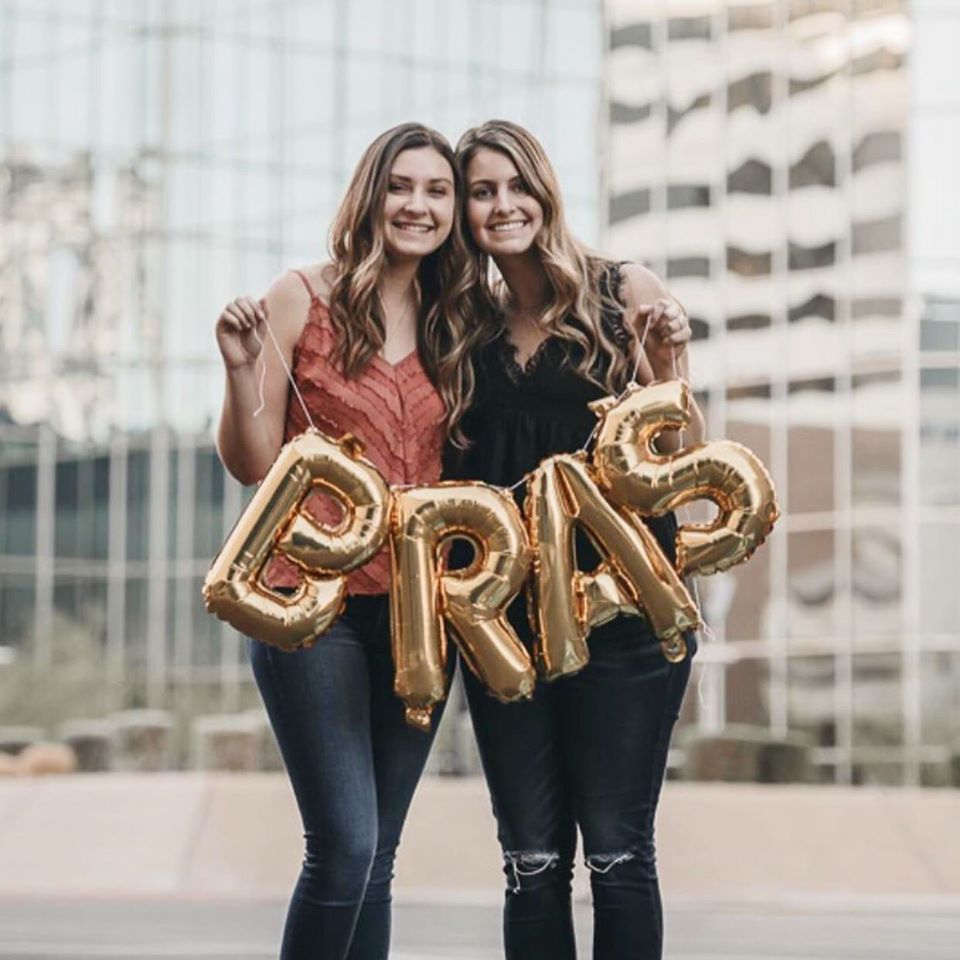
The donation of Bras & Bucks directly help women establish and maintain their own businesses in the developing world. The bras are the inventory for a woman to start her own business selling bras in the second-hand market! And the bucks help Free The Girls with their domestic program and shipping costs.
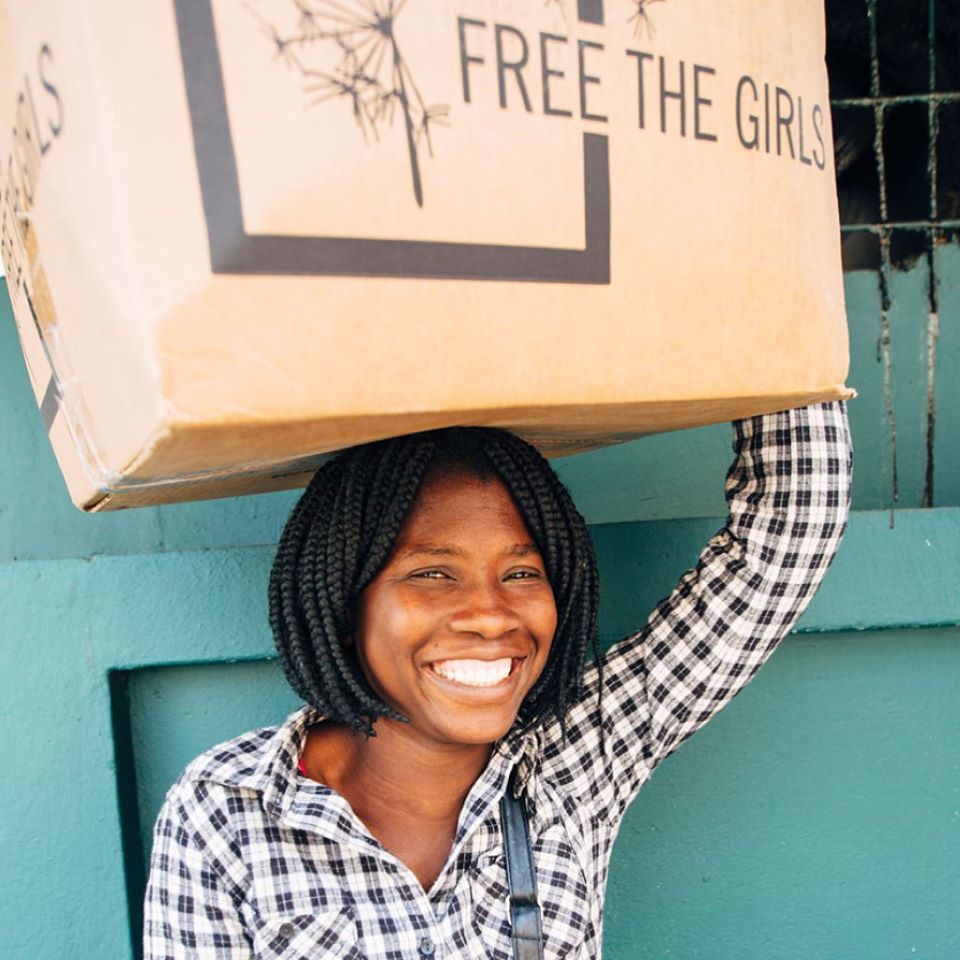
A Free The Girls program member with a box of donated bras for selling at a local market.
But there are challenges in this work. These women have often endured horrific abuse and manipulation leaving them with a deep lack of confidence. Living a life built on mere survival is crushing to the human spirit, and they need to be reminded that their abuse does not define them. A core component of Free The Girls’ work is to inspire independence and a boldness in these women that allows them to dream about their future.
“She changed the entire trajectory of her family’s life…not just hers, but she has now reduced the rate of vulnerability and victimization for all of her children and their children.” – Courtney Skiera-Vaughn, Executive Director, Free The Girls
The story of Fatima leaves a lasting impression. Orphaned at age twelve, an ‘uncle’ showed young Fatima how she could ‘make money.’ For the next twenty years, she survived repeated exploitation.
At 32, she received the opportunity to earn a livelihood through dignified work with Free The Girls. Courtney traveled to Mozambique a few years later and Fatima proudly welcomed her to her home, built on land she owned — all paid for with the money she had earned in her bra business. She invited Courtney to run with her through the vast field next to her home for the sheer joy of showing off her spacious land.
Fatima was also raising pigs, and had given piglets to neighbors to help them start their own businesses. Fatima was thriving and it was contagious. She not only overcame abuse and trauma, but she broke the cycle of systemic poverty and exploitation. Fatima is now a community leader, empowering her own children and others within her community.
“…it is this ripple effect, and just this beautiful strength that these women show and then pass on to generations.” – Courtney Skiera-Vaughn
The ripple effect of hope and change continues with each life empowered. A new legacy unfolds.
Visit Free The Girls to learn practical ways of how you can be a part of encouraging and equipping survivors to flourish.

